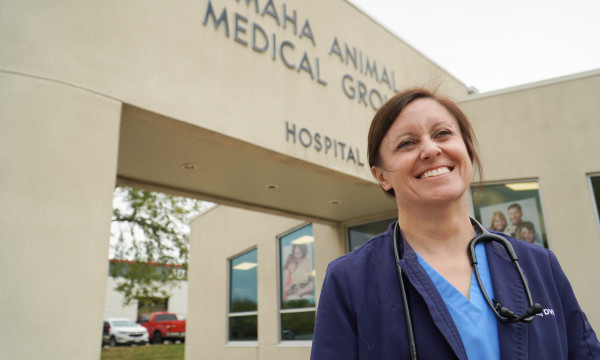TELCOR’s rise in health tech shows power of strategic banking

There are few feelings as heavy as the waiting period after a medical test. A cancer screening; genetic testing for a rare disease; a pregnancy test; a nutrient deficiency revealing a more complex diagnosis. Hours, days, even weeks can feel like years for patients and their loved ones.
In the background, complex medical testing devices (now portable, wireless, and substantially smaller than the devices that came before them) pass information through systems and databases. The faster data can be processed, the more swiftly information can be distributed to people who need it certainly for peace of mind, but also for next steps like diagnosis, treatment, and care.
When the founding team at Midwest-based healthcare technology company TELCOR first identified the market need for a way to aggregate results from point-of-care testing devices (securely and compliantly, of course), there wasn’t much in the way of a blueprint for building a solution. It was the mid-’90s, after all; the dot-com boom was just taking off, and this sort of connectivity was just becoming reality.
What happened next is an inspiring founder story: a combination of complementary skills, experience, and temperaments mixed with a rapidly emerging need. Those key pieces were accelerated by the mindful and strategic use of capital and business banking at the earliest (and arguably most crucial) stages of a business that is today the unquestioned market leader.
Getting off the ground
“We started it as a consulting company,” Deb Larson says. She and co-founders Jim Terrano and Becky Clarke had worked together previously building laboratory systems. They had found a niche consulting in healthcare tech, specifically point-of-care testing, where advancing technology was making it possible to perform more and more complex medical testing for a broader range of diagnostic needs.
“We were working with a client who needed a custom point-of-care middleware software system to integrate point-of-care testing data, and there was no solution at that time,” recalls Deb. Her unique background as a medical technologist includes degrees in microbiology and chemistry and experience in lab information systems and software development. “Jim, Becky, and I are a strong team — very synergistic in our work styles,” she explains, adding that, as consultants, the three gained a first-hand look at the nuances of the problems facing the care providers who would later become their loyal customers.
Global powerhouses like Johnson & Johnson and Hewlett-Packard had been in touch about scoping and building a solution, but the trio ultimately decided to prototype their own.
Almost overnight, TELCOR transitioned from being a consulting firm to a software company, and it needed flexible capital to keep moving. Nebraska-based Union Bank & Trust was eager to connect.
Fueling entrepreneurship and innovation in emerging markets
For founders, it’s a unique combination of circumstances that ignites a powerful spark. A blend of skills and experience provides a rare vantage point into an emerging market need. There’s a deep understanding of that need. The need is ubiquitous, and one worth addressing. There’s a strong business case and vision. There’s a capable and pragmatic person or small group of people who believe in it. These visionaries are aligned on mission, purpose, risk tolerance, and drive.
UBT’s culture is and always has been one that values entrepreneurship and innovation in big — and seemingly small — ways. The bank itself is broad enough in size and scope to help with ideas that range from local, handcrafted goods to massively scalable technologies. What’s more, its commercial lending and business banking teams include experienced experts and local decision-makers prepared to dig into industries and business opportunities in ways that other banks simply can’t or won’t.
“Most banks won’t take risks on software businesses,” Deb Larson says, noting that the challenge of having virtually no business assets was even more significant in the 1990s. UBT’s business lending team went to work — putting in the time and effort to learn the intricacies of the business and its founders. It’s an approach fundamental to the success of early-stage startups, which need financial service providers to grasp the unique market opportunities at stake and their vision for achieving them.
“UBT had such a personal touch,” explains Deb. “At that time, we were in the early stages and building, and we had a loan that needed to be paid off.” UBT’s commercial lending team took care of the loan, transitioning TELCOR into a business line of credit that allowed for more agility and flexibility as the small team pushed to code and deploy a scalable solution.
“UBT was willing to take a risk on us then, and every time we’ve needed them since, they’ve been there for us,” Deb says. It was the beginning of a nearly 30-year business relationship, and the first few steps of a climb toward becoming the market leader in a crucial (and quickly emerging) area of healthcare technology.
Meeting market needs at scale
What TELCOR developed is a universal solution that aggregates and delivers testing data quickly, securely, and compliantly. Its point-of-care middleware solutions receive and report results from hundreds of devices within and outside of traditional lab settings. That includes devices operating at bedside, within near-patient satellite labs, in clinics, and at physician offices. The software also communicates with host systems day and night — making it possible to process test results and keep patient medical records current. That means faster access to critical information, but also more efficiency and fewer errors.
Importantly, the software and TELCOR are device-agnostic — the only solution independent of a device manufacturer. This means healthcare providers and labs don’t need to worry about maintaining a unique software for, say, glucometers, a different software for urinalysis, and yet more unique software systems for devices like molecular analyzers that detect infectious diseases. Simply put: Connecting information across any device type in a centralized and dynamic way enables doctors and other medical practitioners to be more responsive and flexible in how they provide care to patients who need it.
In listening to and truly understanding the pain points facing hospitals, nursing homes, physicians’ offices, pharmacology businesses, clinics, and laboratories, TELCOR has continued to build and expand its offerings in ways that truly address those issues. As customers adopt its solutions, the company has maintained a long view of client relationships, ensuring consistently high retention. Today, TELCOR’s point-of-care solution serves a staggering 2,600+ hospitals — more than 50% of hospitals in the United States.
In 2007, the team spotted another emerging need: Its customers, specifically laboratories, had started to ask if TELCOR could help streamline the processes laboratories were using to bill insurance companies, Medicare, Medicaid, and patients. “This was over 15 years ago when cloud computing was still fairly new,” explains Deb. “So, we built our own data center. We thought this would be a software-as-a-service product for small pathology labs.”
The resulting product was, in fact, much more expansive: a revenue cycle management (RCM) software that today services laboratories of all types (including clinical, molecular, pathology, outreach, and toxicology) and sizes. TELCOR has also expanded to provide a billing service offering alongside it. This allows laboratories to go a step further in outsourcing billing labor to a qualified team of experts at TELCOR.
Treasury management services enhance operational efficiency
A software developer at heart, Deb says expanding product lines is a matter of staying centered on customer needs and letting them lead the way. Even so, the careful management of resources has allowed TELCOR to vastly limit debt on its balance sheet and remain entirely employee-owned without sacrificing innovations like new features and products.
“We’re very proud of the fact that we operate with positive cash flows and our contracted recurring revenue exceeds our expenses, ensuring longevity in the industry,” explains Chief Financial Officer Liz Wood, who worked with the company as an auditor before joining its executive team. She says the approach to problem solving, innovation, and integrity extends beyond product offerings to internal systems and processes.
“That’s one of my very favorite things about Jim Terrano [President and CEO] especially as we’ve grown,” she says, noting a culture of addressing even seemingly small operational pain points swiftly. “At one point, my team came to me and said they were spending a lot of time depositing checks,” explains Liz, who took the problem to Jan Sheridan, VP of Treasury Management at UBT. Jan has a long-standing relationship with the team at TELCOR. She works with businesses of all sizes to help them leverage banking services to offload operational tasks related to payables, receivables, and merchant card services, plus lesser-known solutions that maximize idle funds, mitigate fraud, and otherwise conserve time and resources. To offload the cumbersome task of depositing checks, Jan suggested a UBT service called Lockbox.
It’s a surprisingly simple process: Receivables, including customer payments, are routed directly to a post office box maintained by UBT. Payments are collected, verified, imaged, and deposited same-day by a team of experts at UBT, so companies like TELCOR don’t have to spend time doing it. The service is also coupled with a number of fraud prevention checkpoints to help mitigate errors and issues.
“Our auditors love it; the internal control piece is so great,” Liz says. “And the time savings! It’s saved us days, maybe even a week of time each month across multiple members of our team — maybe more. We just don’t have to worry about it because we know the team at UBT is on it. It’s so worth it. It’s been an absolute game-changer.”
Shared values and mission
What started as a business relationship between UBT and TELCOR has become a true alignment of values — one centered on service. “I think that’s one of the biggest reasons the relationship works so well,” Liz says. “I don’t have to reach out to Jan very often because the whole team is always on it, looking for ways to make things more efficient and effective. And there’s no question in my mind at any given time that if we need something, they’ll make it happen.”
It’s the same approach TELCOR has instilled in its own culture. That commitment to service and doing right by the customer extends from its software development teams to the billing department and from customer service to account management. Ultimately, the team knows it’s not just about early-stage capital and a few lines of code. They know the results of genetic testing, a cancer diagnosis, or the detection of a life-threatening virus can have a huge impact on a person and their family — on their life and their future.
“It’s a big mission,” Liz says, “and we work hard to ensure every teammate feels that. It definitely starts at the top and extends into every level of the company.”
And its founding team? It’s still in place and going strong. Deb is TELCOR’s EVP and Treasurer, Jim its President and CEO, and Becky its EVP and Secretary. Their synergy is widely recognized by the team of now almost 300 — 92% of whom voted to recognize TELCOR as a 2024-2025 Great Place to Work®.
“We’re a strong team,” Deb reiterates. “Then, we surrounded ourselves with good people and partners that helped make it all happen.”
Learning Center articles, guides, blogs, podcasts, and videos are for informational purposes only and are not an advertisement for a product or service. The accuracy and completeness is not guaranteed and does not constitute legal or tax advice. Please consult with your own tax, legal, and financial advisors.




